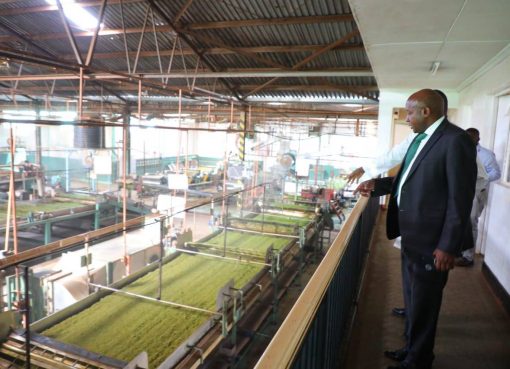The Scrap Metal Council (SMC) has held its first consultative forum, bringing together scrap metal industry stakeholders from across the country to address the challenge of vandalism of critical national infrastructure through regulations.
The SMC is the principal regulator of the scrap metal industry and comprises the Chairperson and nine members from the State Departments for Industry and Transport, KRA, KPLC, National Police Service, Kenya Association of Manufacturers, Consumer Federation of Kenya, Representatives of Associations, and independent members.
The Secretary Administrator in the State Department for Industry, Samuel Karanja Njora, appealed to the stakeholders in the scrap metal business to understand the importance of government regulations to rid the sector of rogue elements.
He noted that scrap metal has always been associated with dirty urchins collecting street scrap for a few coins; however, the industry has evolved and developed into a lucrative business involving millers, scrap metal dealers, and billions of shillings.
“This has consequently attracted high-end criminals who vandalise critical utility government infrastructure, hence the need for regulations,” he reiterated.
Njora advised stakeholders in the business that in order for the industry to be respected, they need to self-regulate through community policing, monitoring one another, keeping a register, and even installing CCTV cameras for accountability.
Making his remarks at the forum in Nairobi, SMC Chairperson Francis Mugo described the meeting as a deliberate attempt by stakeholders affected by the challenges of the scrap metal business to discuss and agree on the recommendations to be added to the Scrap Metal Act of 2015.
While still being neglected and perceived as criminal, Mugo hailed the scrap metal business for being a Sh500 billion industry that employs over 2 million Kenyans, according to data from the Kenya Revenue Authority (KRA).
He revealed that the industry consumes 300 metric tonnes of scrap metal, which, if left lying around, is hazardous to the environment.
“Even as we agree that it is time to change the perception of the public on the scrap metal business, we are still impeded by the biggest challenge of vandalism of critical national infrastructure, particularly in the energy and transport sectors,” said Mugo.
The Chairman, in retrospect, cited the moratorium enforced in 2021 by the previous administration as a consequence of wanton vandalism that led to the increase in prices of steel and construction, affecting stakeholders, and the closure of business.
Since the lifting of the moratorium and the introduction of regulations to the Scrap Metal Act, he continued, solutions were arrived at but failed to pass through the floor of parliament due to a lack of public participation, and that is why the Council is holding consultative forums countrywide.
Mugo highlighted energy and transport infrastructures as the main targets of vandalism, cautioning rogue individuals who vandalise transformers, pylons, road guard rails, and railway infrastructure and sell them to criminal scrap metal dealers and millers to stop tarnishing the industry’s reputation.
“As a Council, we vow to scrutinise and vet the license application process and review and amend certain regulations of the Act to seal all loopholes, help legal and genuine dealers do business, and consequently bring sanity into the industry, which will spur economic growth,” he pledged.
Meanwhile, stakeholders from the most vandalised infrastructures, including Kenya Power & Lighting Company (KPLC), Kenya Electricity Transmission Company (KETRACO), Kenya Railways, and the Kenya Roads Board, condemned the vandalism of these infrastructures, which in most cases causes death and lack of utility services to the citizens.
Stephen Muoko, Chief in Charge of Operations at KPLC, presented shocking details of how many transformers, costing approximately 1 million shillings, have been lost since the Financial Year 2017-18 to date.
“In sequence, we have lost 316, 266, 310, 422, and 566 transformers over the last five Financial Years due to vandalism, which is a massive loss to the government considering the cost to replace them,” Muoko exemplified.
They lauded partnerships as the only way to work together with dealers, recommending sensitization before the purchase of scrap metal materials, strengthening the Council to deploy inspectors countrywide, and networking through information sharing (either reporting or exchanging ideas) through the toll numbers 911 (KENTRACO), 0711031874 (KPLC), 0711777577 (Kenya Railways), and 0800222248 for security agencies in the Energy Ministry.
Additionally, both the Council and the security agencies, including the police, called for a multi-agency approach with integrity involving all stakeholders, the County Commissioner, and the Regional Environment Officer (REDO) to collaborate and enforce strict measures on those found culpable of vandalism, which ruins the industry’s reputation.
On their part, scrap metal dealers appealed to the police to stop harassing legitimate and genuine dealers and millers and also urged the Council to protect them by enforcing the agreed-upon regulations in order to eliminate rogue elements amongst them and also inside the stakeholder agencies, which would reinstate the respect scrap metal businesses deserve.
By Michael Omondi



